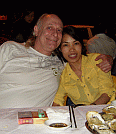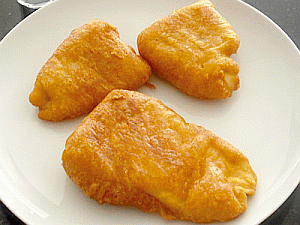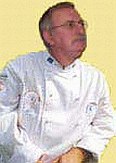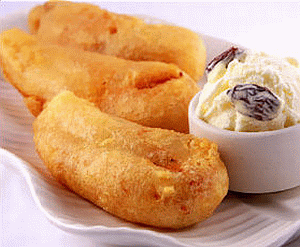|
|
| How
Do I Make ... ? |
Batter |
|
The simple answer is you mix equal quantities
of flour and water plus add a little salt and pepper
to taste.
However, you need to alter this basic mixture depending
upon what you are cooking (Sweet or savory?) and how
you like it (Thin and crispy or thick and puffy?)
Recipe Source:
 |
Jonno, China Expats, Foshan, China |
|
|
| Websites:China
Expats.com |
Jonno is a keen chef for friends
and family. He has cooked and interpolated many
dishes over the years, and invented ones of his
own:
He uses batter for making fish and chips and also
corned beef fritters in China. The dessert
version at the bottom of the page he uses
for Lychee, Mango and Papaya. |
|
| |
|
|
| 1. Let's get started:- Savory
Batter |
| |
|
This batter is ideal for fish and chips, or
corned beef fritters.
Ingredients:
• 4oz self raising flour (MacDougall's is
best)
• Same amount by volume of water
• Pinch of salt and pepper to taste (Optional)
Sieve the flour a couple of times before you begin.
Put all the dry ingredients in a bowl and mix
thoroughly. Stir in the water until smooth and
the consistency of single cream. This is a thin,
light batter.
|
 |
Note:
Add 1 teaspoon of baking powder if using plain flour
(Self-raising flour already has Baking powder added).
There are two types of baking powder
• Slow acting : this needs to be rested for at
least 20 minutes before use.
• Instant : This type activates immediately upon
contact with heat and is recommended.
Cooking:
Dip fish or other into the batter and then slowly put
into hot oil (170 degrees). Some people dust the fish
with flour to aid batter sticking. I do this for corned
beef fritters, but not fish. Cook for up to 3 minutes
per side, turning once. Reduce slightly for smaller
fish portions.
Tip:
Do not over-work the batter.
Expert Variations:
There must be a million different ways to make batter,
and you need to experiment to find the one(s) that suit
you best. First we will describe what other ingredients
do:
Flour - We are looking for a flour
that has a high level of protein and starch. The starch
makes the batter crisp, whilst the protein makes it
stick. As a rough Western guide self-raising flour is
probably better.
The only problem with self-raising flour is that you
do not know if the manufacturer has added the 'instant'
or 'slow acting' type of Baking Powder? Hopefully it
says on the outside of the pack.
Eggs - many people add eggs, but we
do not recommend this as this is for specialist tempura
batter recipes only. If used, then only add the egg
whites and remove the yolk from 1 large or 2 eggs. The
egg whites work as in a meringue, making the batter
lighter and puffier. However, you will also need this
mixture to be quite thick, which in turn makes the batter
coating thicker. If not cooked exactly right it either
becomes stodgy (Undercooked) or like a savory honeycomb
(Overcooked). Best avoided for fish and chips, where
cooking the egg-batter correctly means the fish is over-cooked
and dry. Ourselves and Hub-UK are seriously against
adding eggs to British batter mix.
Water - Tap water usually produces
a hard batter. Lighten this by using soda water (Sparkling
water). In China use bottled water only.
Beer - A light pilsner beer such as
Stella Artois acts in exactly the same way as soda water,
plus adds a little taste that is delicate.
Bi-Carbonate of Soda - Add a teaspoon
of this if using tap water - to recreate soda water
... how do you think they make soda water? Do not add
if using soda water or beer. Baking Soda (The same thing)
reduces acidity and adds crispness.
Lemon Juice - Adding a squeeze of lemon
juice to a fish batter really works well and enhances
the flavour harmoniously. Be careful of acidity here,
as this may mean you need to add a small pinch of Baking
Soda to soda water or beer mixtures.
Milk - Many recipes use milk instead
of water. We do not recommend adding milk, as this makes
for a stodgier mix. It also increases acidity (Lactic
acid); which in turn alters the balance of all the other
ingredients.
Oil - Again, many recipes add oil and
we really do not see the point of this. Most oil is
added with mixtures containing the whole egg (Including
the yolk) and milk. This produces an extremely thick
batter you need to apply with a trowel. Canola and its
pedigree parent Olive Oil both have low burning temperatures,
so when fried in a hot oil like corn oil, they will
burn - don't go there!
Tips and Tricks
1. Our standard batter can be used
immediately, but other ingredients require resting for
between 15 and 30 minutes. Therefore we would recommend
you make the batter, put the cooking oil to heat, and
prepare the fish in that order.
2. Use a high temperature oil such
as sunflower oil. Do not use olive oil as this has a
low temperature. Do not use cheap Chinese peanut oil
as it is industrial grade which smells and tastes awful.
Its refined version is called Ground Nut oil, and is
fine unless you have peanut allergies?
3. In China we recommend you have a
special gas ring set to its highest temperature, as
usually Chinese hobs are turned down too low by default.
Do it yourself by locating the metal ring flow adjuster
on the metal pipe inside the unit, usually set just
before it reaches the hob, and open its ratchet valve
to full. You can usually do this with your fingers.
4. When making fish and chips using
only one fryer, blanch the chips - meaning to part cook
them, and set aside ready for a final few minutes frying
after you have cooked the fish and are presenting it
for table.
5. Temperature. The oil is hot enough
when a small piece of batter sizzles when dropped in,
and quickly rises to the surface. Use the same method
for chips (French Fries). If you have a cooks thermometer,
then remember it must not touch the sides or base, as
otherwise you will get a higher reading.
6. Woks are good for both fish and
chips. You can increase the temperature of hobs set
too low by putting the lid on - but remember to check/stir
regularly.
7. Virtually all white fish are ok,
with cod and haddock being favourites. In China you
need to interpolate, so buy sea fish (No small bones)
and especially cuts from the larger filleted fish at
wet markets - one of which has deep blue skin and tastes
quite like cod. Another excellent choice is Yellow Flower
Fish (Wong Fa Yue in Cantonese, Huang Far Yue in Mandarin),
which is a sea fish with gray and silvery sides, and
a bright yellow colour to its underside. This tastes
very similar to sardines - but can grow to very large
size. Recommended for those who prefer Mackerel or oily
fish.
8. Remove fish when golden brown, and
place on kitchen paper to dry. This is when you would
cover the wok, wham up the gas to full, and finish cooking
the chips.
Yeast Batter Alternative:
 |
David Jenkins, Hub UK, Ipswich, England
& Wales |
|
|
| Websites: Hub-UK |
| David is an excellent chef
who has worked in Raymond Blanc's kitchens as
well as his own. His enthusiasm for food is complemented
by his excellent and self-made website dedicated
to good food, recipes and chef's tips, and all
things related to the culinary arts. David also
offers cooking holidays all over the world, which
he complements by offering wine holidays also.. |
|
| |
Neither we nor David recommend this recipe for battered
fish with chips - as it takes a long time and is temperamental
to heat and prevailing kitchen conditions. Neither do
we think it suits fish and chips. David's fish batter
recipe is basically the same as our own above - given
the variables listed.
Yeast is available at good supermarkets in China, but
difficult to find. These also tend to be the biggest
supermarkets in the city. Yeast is usually hidden between
the herbs and spices section and the weird Chinese condiments
shelves. If you have a choice, then choose a bread yeast.
a. Sieve the flour at least twice to
evenly distribute gluten content and place in a cool
oven to warm
b. Dissolve the yeast in a little warm
water with a pinch of sugar (Needed for the yeast to
work)
c. Make a well in the flour and pour
in the yeast
d. Sit in a warm place (not over 37ºC)
until the yeast starts to bubble
e. Combine the flour and yeast with
enough water (approx. 200 ml) to form a smooth batter
f. To allow the yeast to fully activate,
allow the batter to rest for at least 30 minutes
It is recommended that the batter is tested before
using, as the warmth of the kitchen, the water, the
flour will all effect how quickly or slowly the yeast
ferments
Add seasoning at this stage, if added earlier
the salt may destroy the yeast.
This recipe courtesy of Hub-UK
and reproduced under Collective Commons 3 licence Thanks
David!
Other savory batter recipes
1. Corned beef fritters are excellent,
and made from the tinned UK style Bully Beef cut into
thick slices. Flour the meat and dip in the batter,
cooking as above.
2. Onion Rings are easy to make, simply
by slicing a peeled whole onion with the grain and breaking
so a couple of rings remain together. Dry, flour, and
dip in the batter mix. Fry till golden brown.
3. Battered Mushrooms follow the same
pattern = prepare, dip in batter, fry. Chip shops usually
prepare these on a skewer, which is done after cooking.
4. Battered Cauliflower Florets - an
unusual combination we came across during our research.
Apparently they are delicious. Prepare and cook as above.
Add a little finely shredded Cheddar to the dry ingredients
for something quite special!
| 2. Let's get started:- Batter
for Sweet Courses |
| |
|
4 ounces of flour
1 ounce of butter
1/2 ounce of sugar
1 gill of water
Mix the flour with 6 fluid ounces of cold water
(1 gill in English) to a smooth paste. Dissolve
the butter in a saucepan; then stir in the flour
and the water. Add the sugar last. It is then
ready for use.
This batter recipe is ideal for dessert dishes
like banana or pineapple fritters. Simply peel
and dry the fruit, dip in the batter mix, and
fry in fresh oil at 170 degrees for a few minutes
until golden brown. |
 |
Other Batter Recipes
Indian batter is normally made from Chickpea (Besan)
flour, which is very high in protein and starch. This
is what is used to make such classics as Onion Bhaji
and Pakora. Indian batter usually includes spices (Typically:
Cumin and Turmeric + others) and egg whites, which are
added immediately before use. We will deal with Indian
cuisine at a later date, and link here as appropriate.
|
|
|
This information is as supplied by ourselves, and ably
supported by our friends and various internet portals.
In particular we wish to thank David Jenkins and our
friends at Hub
UK for their invaluable support and advice |
|
|